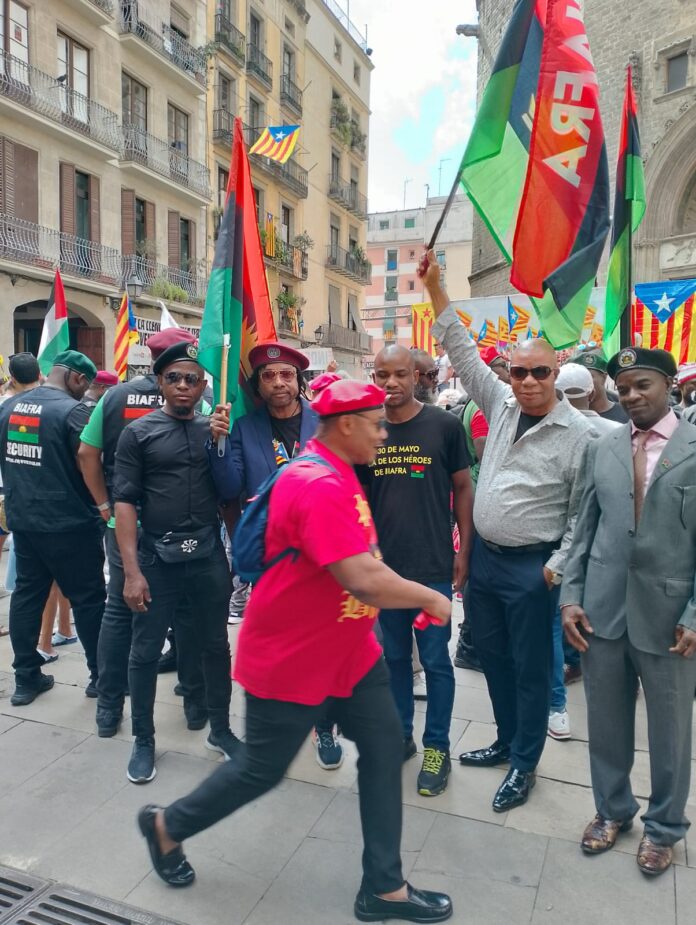The Indigenous People of Biafra (IPOB) has vehemently denied allegations by the Nigerian Army that 13 of its members were killed in a recent military operation. The group labeled the claims as “baseless” and an attempt to malign its image on a global stage.
In a strongly worded statement released on Wednesday, IPOB’s spokesperson, Emma Powerful, dismissed the military’s assertions as “illusory” and “unsubstantiated.” According to him, no IPOB members or Eastern Security Network (ESN) operatives were harmed in the alleged incident.
“The claims by the military spokesperson of killing 13 IPOB members are not only false but illusory. IPOB family members and ESN operatives are all intact,” he declared.
Disputed Narrative
The controversy began when the Nigerian military reported that it had neutralized 13 members of IPOB during what it described as a counter-insurgency operation. While details of the operation were not disclosed, the military’s assertion triggered immediate pushback from IPOB.
Emma Powerful emphasized the non-violent nature of IPOB, reiterating that the group is solely focused on self-determination for the Igbo people. “As long as IPOB and the international community are concerned, IPOB members are a non-violent self-determination movement,” he said.
However, Powerful distinguished between IPOB’s civilian advocacy and the activities of the ESN, which he described as an armed vigilante outfit dedicated to protecting communities in the South-East from external threats, particularly the menace of armed herdsmen.
He further noted: “ESN are disciplined vigilantes that are mandated to dislodge Fulani terrorists and kidnappers masquerading as herdsmen in the South-East forests and bushes. IPOB will not retreat nor surrender in defending our people or in restoring our fatherland – Biafra Nation.”
Background of IPOB and ESN
The Indigenous People of Biafra, founded by Nnamdi Kanu, has been at the forefront of agitations for the secession of the South-East region from Nigeria. IPOB cites alleged marginalization and systemic oppression of the Igbo people as the basis for its struggle.
The group’s non-violent rhetoric, however, contrasts with the military’s portrayal of it as a security threat. This has led to a protracted and often violent conflict in the region.
In December 2020, IPOB announced the creation of the Eastern Security Network, a paramilitary group tasked with defending local communities from attacks by criminal elements and armed herdsmen. While the ESN insists it operates as a protective force, Nigerian authorities have classified it as a terrorist group.
Rising Tensions in the South-East
The latest controversy is part of a broader escalation of tensions between IPOB and the Nigerian government. The South-East region has witnessed increased military presence and clashes, raising concerns among human rights organizations about the potential for abuses.
In recent months, accusations of extrajudicial killings, forced disappearances, and mass arrests have been leveled against security forces operating in the area. For IPOB, these actions are attempts to crush their movement, while the government defends its operations as necessary for national security.
Observers fear that the ongoing conflict is deepening mistrust and alienation in the region, potentially undermining efforts for dialogue and reconciliation.
Calls for Proof
Emma Powerful’s statement challenged the Nigerian Army to provide evidence to support its claim of killing 13 IPOB members. He argued that such accusations were part of a broader disinformation campaign designed to criminalize IPOB and justify heavy-handed military operations in the South-East.
“If they have proof of any so-called IPOB member or ESN operative killed, they should present it to the world,” he said.
International Implications
IPOB has consistently sought to draw international attention to its cause, framing its struggle within the broader context of self-determination movements globally. The group has criticized the Nigerian government for what it describes as the weaponization of state security forces to suppress dissent.
Powerful noted that the organization remains committed to achieving its goals through lawful and peaceful means, despite alleged provocations.
“Our resolve for the Biafra nation remains unshaken,” he added. “We call on the international community to investigate the atrocities being committed by the Nigerian state against the people of the South-East.”

